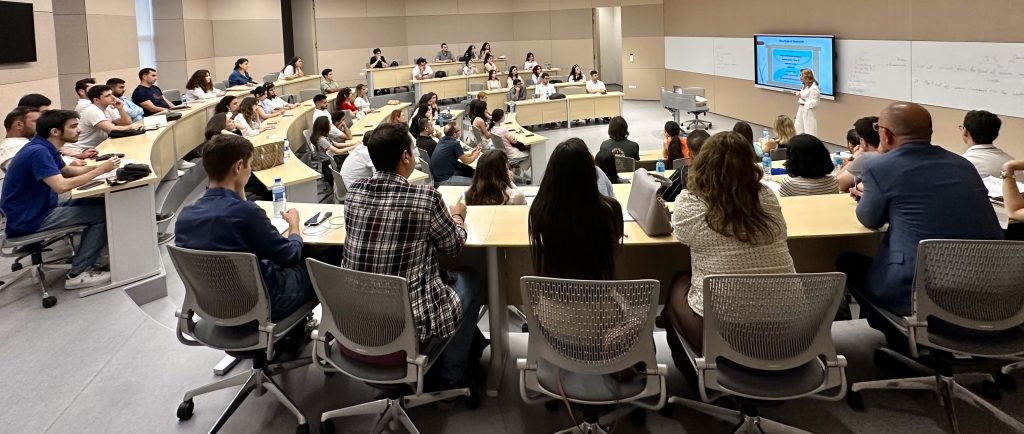Emotional Resilience as a Tool for Academic Success in University Students

Understanding Emotional Resilience in University Students
In today’s competitive academic landscape, university students find themselves grappling with a multitude of pressures that can significantly impact their mental and emotional well-being. As the stakes rise, particularly in the context of Nigeria’s higher education system, the ability to harness emotional resilience becomes crucial. This skill helps students not only to cope but also to flourish in an environment rife with challenges. Cultivating this resilience can profoundly influence their academic and personal trajectories.
Unique Challenges Faced by Nigerian Students
Nigerian university students face a diverse range of stressors that can adversely affect their mental health and academic outcomes. For instance, high expectations to perform in competitive academic settings often lead to overwhelming pressure. This is especially true in Nigerian universities where the number of applicants vastly exceeds available spaces in key programs. Furthermore, the financial difficulties that many students encounter can severely limit access to study materials, technology, and necessary resources, adding another layer of stress. The fluctuating economic conditions in the country mean that many students must balance their studies with part-time jobs, further complicating their ability to succeed.
Additionally, social dynamics within universities can influence students’ mental health. Navigating friendships, relationships, and peer pressures can be emotionally taxing, leading to feelings of isolation or anxiety. These factors have been linked to higher rates of burnout, which can detract from academic performance and overall well-being.
Benefits of Developing Emotional Resilience
Students who actively work on building their emotional resilience gain a set of essential skills. These skills enable them to:
- Manage stress effectively: Students learn techniques such as mindfulness and time management, which can help mitigate the pressures of academia.
- Embrace challenges as opportunities for growth: Instead of viewing setbacks as failures, resilient students interpret them as chances to learn and improve.
- Maintain motivation in the face of setbacks: By cultivating a positive mindset, students can stay focused on their goals, even when faced with obstacles.
Research supports the assertion that students who exhibit high levels of emotional resilience are more likely to achieve favorable academic outcomes. They possess the remarkable ability to recover from disappointments and setbacks, viewing failures as stepping stones rather than roadblocks. This perspective not only enhances their educational experiences but also prepares them for future challenges, both academically and in their personal lives.

Strategies for Fostering Emotional Resilience
To further develop emotional resilience, students can employ a variety of strategies. Engaging in regular physical activity, seeking support from mentors or counselors, practicing gratitude, and connecting with peers are all effective methods. Establishing a support network can help students feel less isolated and more equipped to tackle challenges head-on. Universities in Nigeria are increasingly recognizing the importance of mental health resources and are beginning to offer workshops and counseling services aimed at empowering students to build resilience.
In conclusion, becoming emotionally resilient is not merely an advantage but a necessity for university students navigating the complexities of modern education. By investing time and effort into developing this critical tool, students can unlock their potential and pave the way for lasting success in their academic journeys and beyond.
RECOMMENDED: Check out this similar article
Building the Foundation for Emotional Resilience
Emotional resilience is not an innate trait but a set of skills that can be developed over time. For university students, particularly in Nigeria, mastering these skills is essential to navigating the complex demands of their academic life. Students must understand that emotional resilience is comprised of various components that collectively enhance their ability to manage stress and adapt to challenging circumstances.
Core Components of Emotional Resilience
Several key aspects contribute to emotional resilience, empowering students to not only cope with adversity but thrive academically. These include:
- Self-awareness: Understanding one’s emotions and reacting appropriately to stressors is foundational. Students who cultivate self-awareness can identify when they are overwhelmed and take proactive steps to address their feelings before they escalate.
- Emotional regulation: The ability to manage emotions effectively can differentiate successful students from those who struggle. Resilient individuals practice techniques that allow them to remain calm under pressure, enabling them to focus on their studies rather than being derailed by anxiety or frustration.
- Social support: Building connections with peers, family, and academic mentors enhances emotional resilience. When students feel supported, they are more likely to tackle challenges head-on and seek assistance when needed, fostering a sense of belonging and community.
Research highlights the significance of these components, demonstrating that students exhibiting strong emotional resilience frequently achieve higher academic success. They can pivot from setbacks and maintain their focus on long-term objectives, which is particularly important in highly competitive environments like Nigerian universities. The benefits extend beyond the classroom, influencing students’ overall well-being and yet-to-unfold futures.
Integrating Emotional Resilience into Daily Life
Practical integration of emotional resilience skills into daily life can further enhance a student’s academic journey. Incorporating these practices into a routine can ensure that emotional resilience becomes part of their regular experience. For example, students may engage in activities such as:
- Mindfulness meditation: Practicing mindfulness can help students become more aware of their thoughts and emotions, fostering a relaxed mental state that supports better learning.
- Journaling: Keeping a journal allows students to process their experiences and reflect on their emotional responses, helping to cultivate a greater understanding of their behaviors and feelings.
- Setting realistic goals: Establishing attainable objectives can help students manage expectations and maintain motivation, providing a clear direction in times of uncertainty.
Harnessing these practices enhances emotional resilience, resulting in improved academic performance. As emotional resilience becomes an integral part of students’ lifestyles, they are better prepared to face setbacks with optimism and hope, laying the groundwork for sustained success throughout their university years and beyond.
Understanding Emotional Resilience in Academic Settings
Emotional resilience is increasingly recognized as a crucial factor in achieving academic success among university students. It refers to the ability to adapt to stressors, overcome challenges, and bounce back from setbacks. In the fast-paced environment of higher education, where the pressures of coursework, deadlines, and social dynamics can overwhelm students, emotional resilience can serve as a vital tool for enduring these pressures.
Students who cultivate emotional resilience tend to exhibit better coping strategies in the face of adversity. They are more likely to view challenges as opportunities for growth rather than insurmountable obstacles. This shift in mindset is fundamental, as it allows students to maintain motivation and engage actively in their studies, leading to higher academic performance.
Moreover, emotional resilience contributes to the development of proactive behaviors in students. Those equipped with these skills often seek help when needed, build supportive networks, and manage their time effectively, all of which are essential for thriving in university life. Studies have shown that emotional resilience is also linked to improved mental health outcomes, which can reduce the risk of burnout and anxiety among students.
In light of these insights, educational institutions are increasingly focusing on programs and initiatives aimed at fostering emotional resilience among their students. By embedding emotional intelligence in the curriculum, universities are enhancing not only the academic performance but also the overall well-being of their students.
| Category 1 | Category 2 |
|---|---|
| Stress Management | Developing coping mechanisms to manage academic pressures effectively. |
| Adaptability | Embracing change and challenges as pivotal components of personal and academic growth. |
This targeted approach not only aids students in their current academic pursuits but also equips them with essential life skills that will be invaluable long after they graduate. As universities continue to evolve in their support for student development, the emphasis on emotional resilience is likely to become even more pronounced.
SEE ALSO: Click here to read another article
Practical Strategies for Enhancing Emotional Resilience
As students strive for academic success in university, the enhancement of their emotional resilience becomes increasingly vital. Nigerian universities present unique challenges, from intense academic pressures to financial constraints, making it imperative for students to develop practical strategies that foster resilience.
Effective Coping Strategies
To cultivate emotional resilience, students can benefit from adopting a variety of coping strategies tailored to their individual needs. These could include:
- Establishing a support network: Students are encouraged to actively engage with their peers, family, and faculty. Forming study groups not only enhances understanding of course material, but it also provides an avenue for emotional exchange, where students can share challenges and advice.
- Seeking professional help: Many universities in Nigeria are beginning to recognize the importance of mental health services. Students should feel empowered to utilize campus counseling services to gain insights and strategies for dealing with academic pressure and personal struggles.
- Physical activity: Regular physical exercise is a powerful mood booster. Engaging in sports, jogging, or even brisk walking can significantly alleviate stress. In a country filled with vibrant sporting cultures, joining a campus sports team can foster both physical health and social connections.
Those who proactively implement these strategies report higher levels of engagement and satisfaction in their academic pursuits. By employing various coping mechanisms, students are better equipped to navigate the trials of university life.
The Role of Time Management
Time management is a crucial factor that influences emotional resilience. Students who master the art of prioritizing tasks often reduce the overwhelming feelings associated with looming deadlines. Techniques such as the use of planners or digital apps can facilitate organization, allowing students to allocate time effectively between studying, socializing, and relaxation. For instance, the Pomodoro Technique, which encourages focused work periods interspersed with short breaks, can significantly enhance concentration and reduce burnout.
Moreover, setting aside specific times for self-care amid rigorous academic schedules cannot be overstated. Such practices not only bolster emotional resilience but also promote a balanced lifestyle conducive to learning.
Long-term Strategies for Sustained Resilience
Beyond immediate coping techniques, students need to invest in long-term strategies that fortify their emotional resilience over time. These include:
- Continuous learning and self-improvement: Engaging in workshops focusing on personal development and resilience, offered either by universities or community organizations, can provide valuable skills that enhance students’ adaptability.
- Fostering gratitude: Regularly practicing gratitude, such as documenting things one is thankful for, can shift focus from negative to positive experiences, thereby alleviating stress and promoting an optimistic outlook.
- Cultivating a growth mindset: Embracing the idea that abilities and intelligence can be developed through effort can empower students to face challenges with a problem-solving attitude rather than feeling defeated by setbacks.
By embedding these long-term strategies into their academic routine, university students position themselves for sustained emotional resilience. This preparation not only allows them to face present challenges with increased confidence but also equips them with the necessary tools for future endeavors beyond the classroom. Ultimately, enhancing emotional resilience is not merely an academic strategy; it is a holistic approach that fosters lifelong learning and personal growth.
RECOMMENDED: Check out this similar article
Conclusion: The Impact of Emotional Resilience on Academic Success
In the dynamic and often unpredictable landscape of university life, emotional resilience emerges as a crucial pillar for students aiming for academic success. By cultivating resilience, students not only equip themselves to tackle the rigorous demands of their studies but also foster the ability to adapt to life’s inevitable challenges. The strategies discussed—including establishing supportive networks, leveraging professional mental health resources, and prioritizing self-care—offer practical pathways for students to build their emotional strength. Furthermore, effective time management and a commitment to continuous self-improvement are vital components that contribute to this resilience.
It is essential to recognize that enhancing emotional resilience is not a quick fix but a lifelong journey that yields profound benefits beyond academic performance, including personal growth and improved well-being. As Nigerian universities expand their mental health initiatives, students are encouraged to embrace and utilize these resources actively. Engaging in altruistic practices like fostering gratitude and adopting a growth mindset paves the way for an optimistic and adaptive outlook, shaping not just better students but well-rounded individuals.
Ultimately, the intertwined nature of emotional resilience and academic success serves as a reminder that education is not solely about acquiring knowledge but also about developing the emotional tools necessary for life’s myriad challenges. By prioritizing emotional resilience, students in Nigeria can unlock their full potential, ensuring that they are not only successful academically but also equipped to navigate the complexities of the world beyond the university gates.


